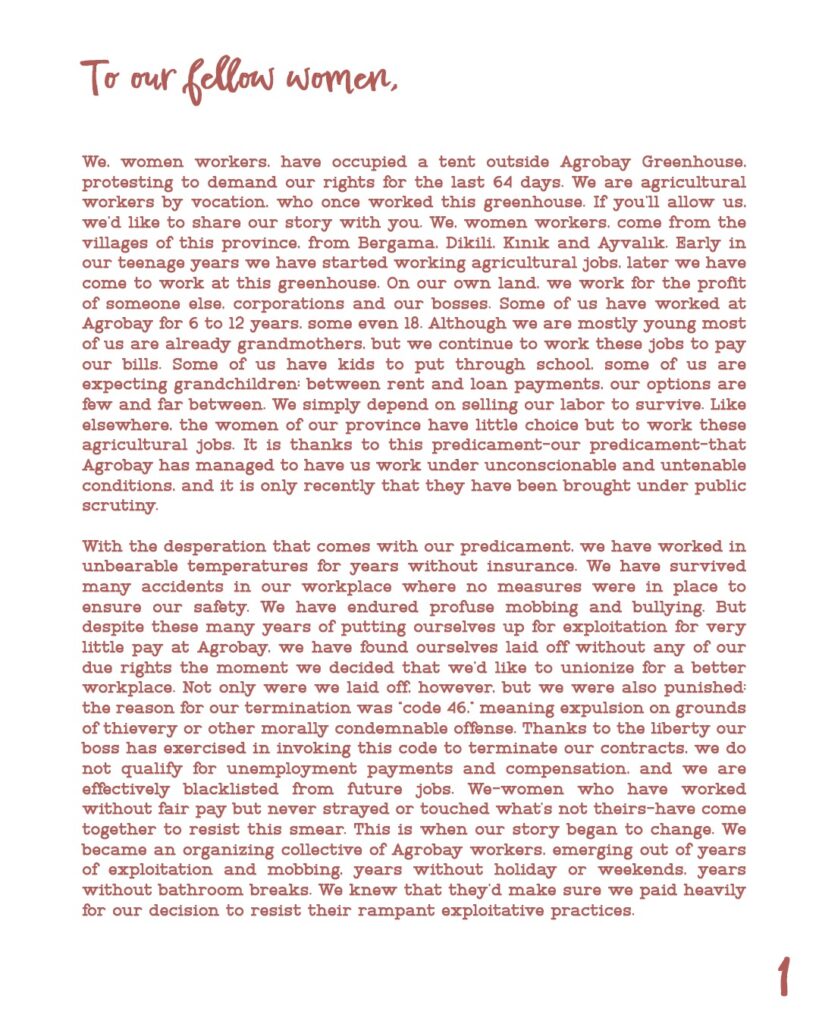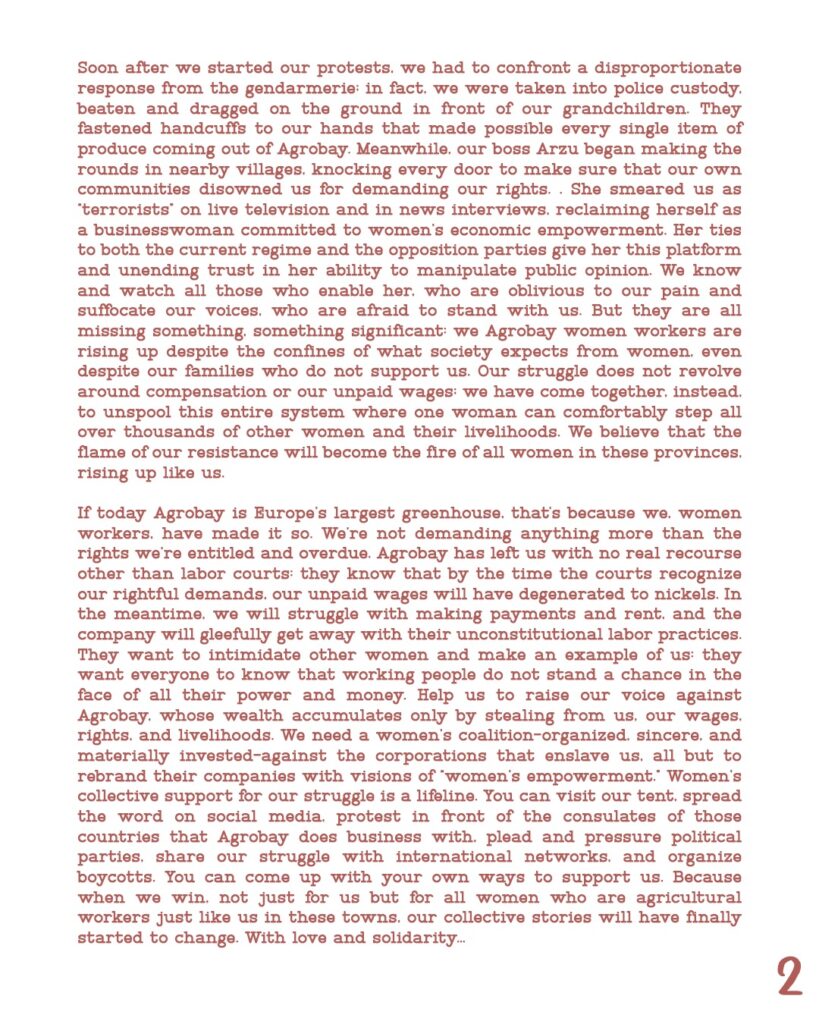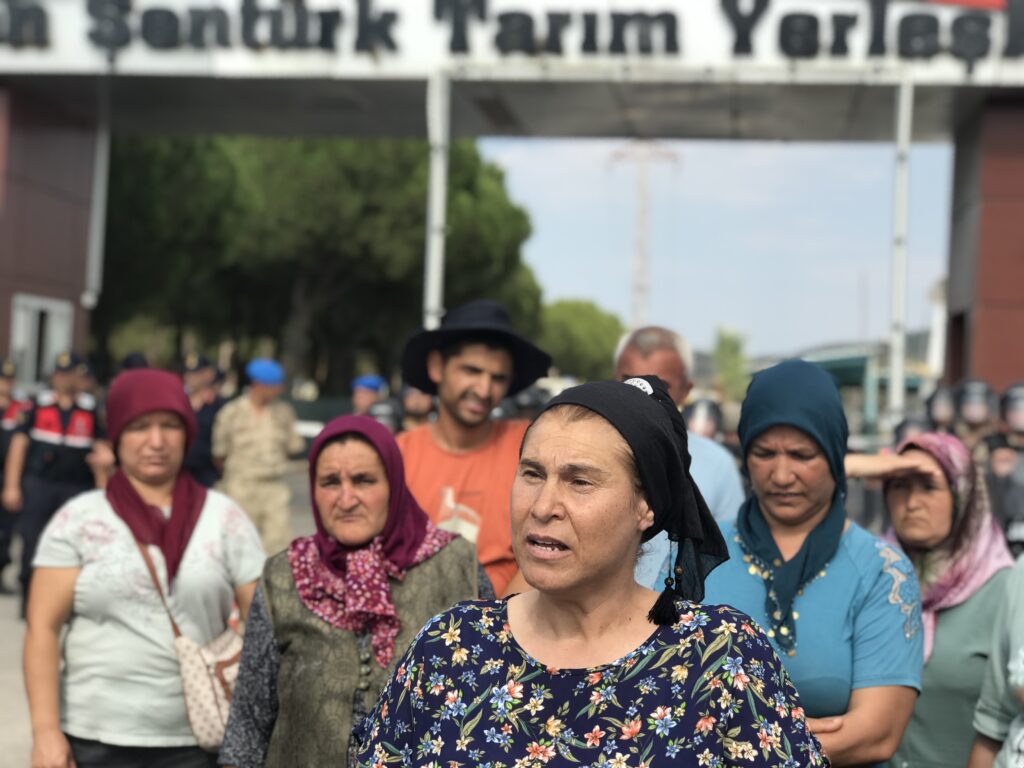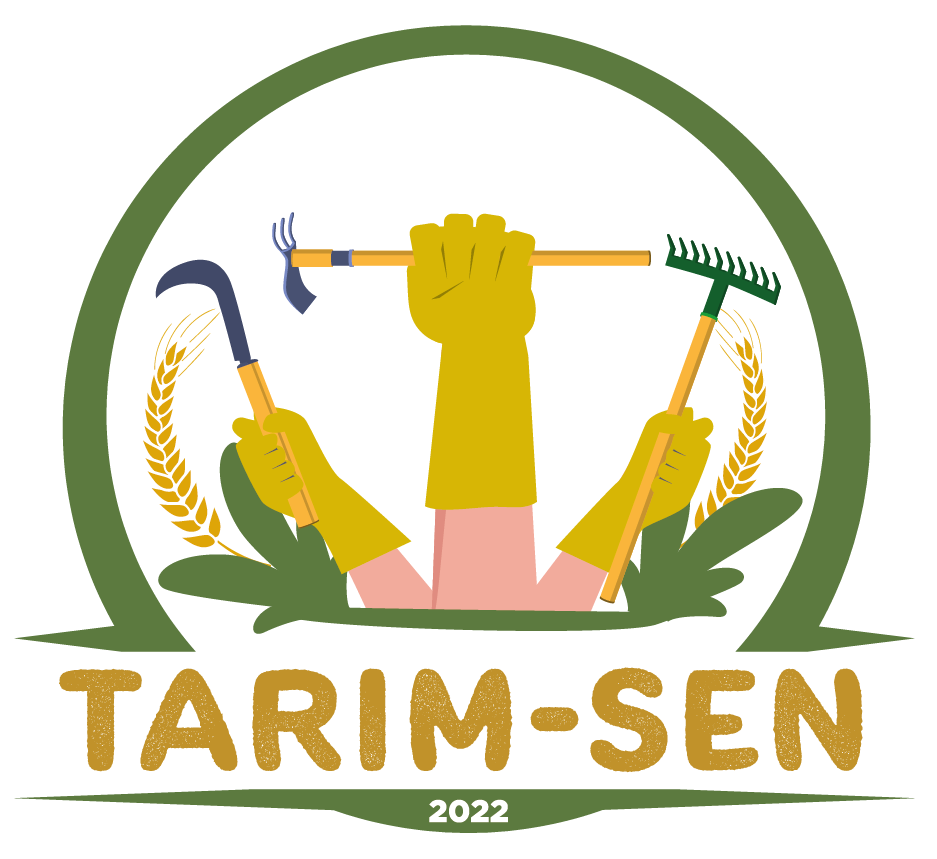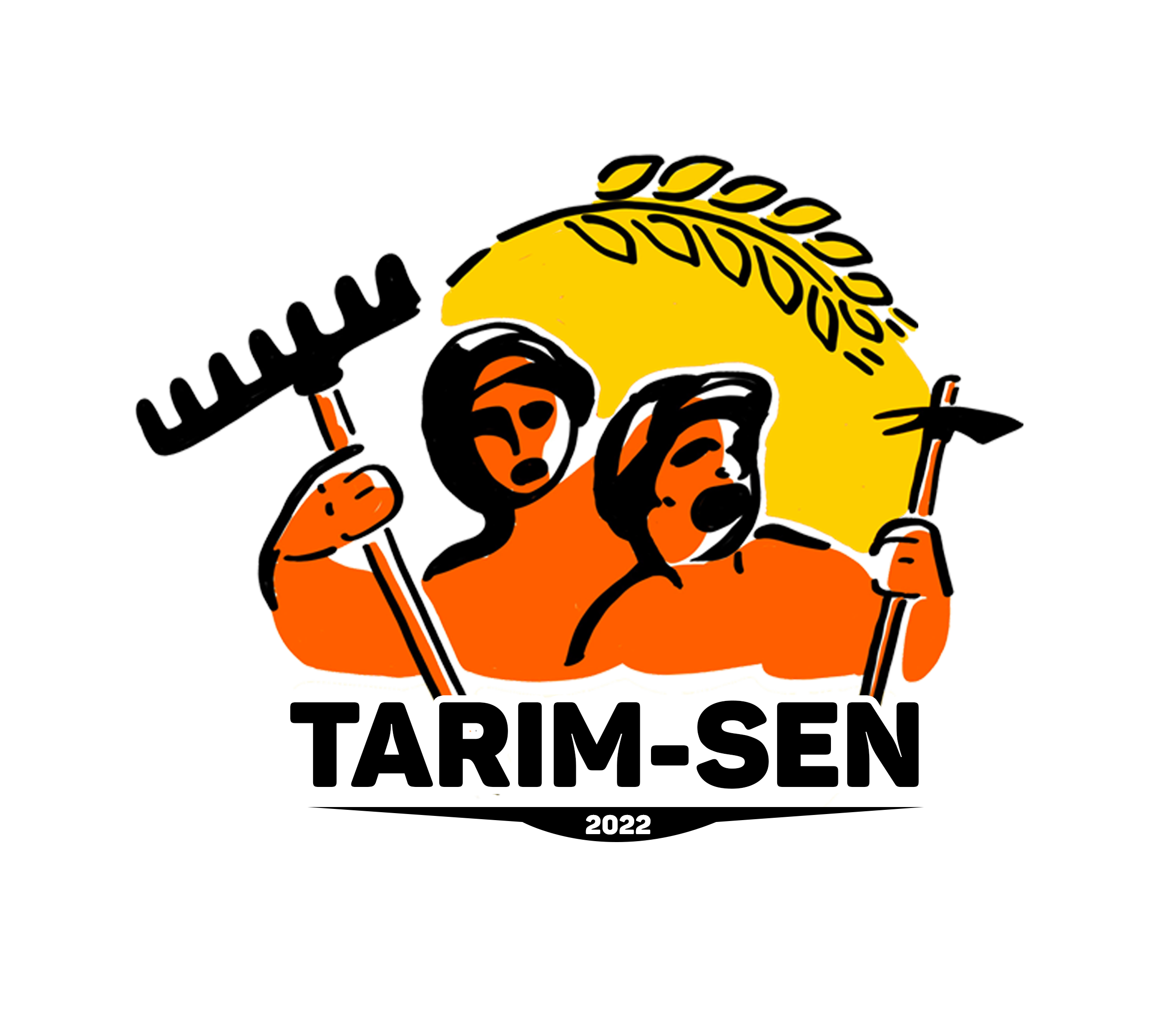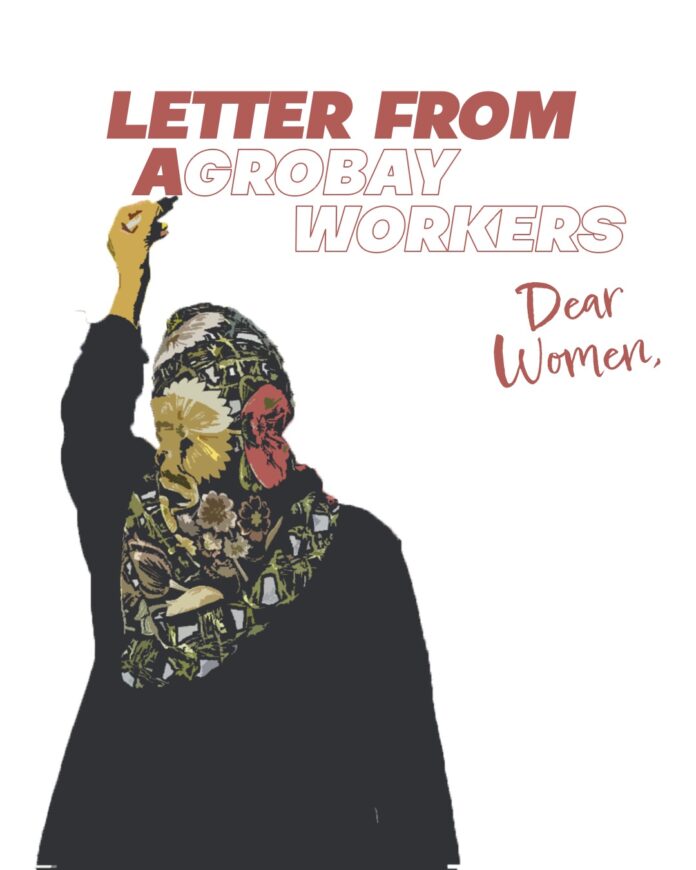To our fellow women,
We, women workers, have occupied a tent outside Agrobay Greenhouse, protesting to demand our rights for the last 64 days. We are agricultural workers by vocation, who once worked this greenhouse. If you’ll allow us, we’d like to share our story with you. We, women workers, come from the villages of this province, from Bergama, Dikili, Kınık and Ayvalık. Early in our teenage years we have started working agricultural jobs, later we have come to work at this greenhouse. On our own land, we work for the profit of someone else, corporations and our bosses. Some of us have worked at Agrobay for 6 to 12 years, some even 18. Although we are mostly young most of us are already grandmothers, but we continue to work these jobs to pay our bills. Some of us have kids to put through school, some of us are expecting grandchildren; between rent and loan payments, our options are few and far between. We simply depend on selling our labor to survive. Like elsewhere, the women of our province have little choice but to work these agricultural jobs. It is thanks to this predicament—our predicament—that Agrobay has managed to have us work under unconscionable and untenable conditions, and it is only recently that they have been brought under public scrutiny.
With the desperation that comes with our predicament, we have worked in unbearable temperatures for years without insurance. We have survived many accidents in our workplace where no measures were in place to ensure our safety. We have endured profuse mobbing and bullying. But despite these many years of putting ourselves up for exploitation for very little pay at Agrobay, we have found ourselves laid off without any of our due rights the moment we decided that we’d like to unionize for a better workplace. Not only were we laid off, however, but we were also punished: the reason for our termination was “code 46,” meaning expulsion on grounds of thievery or other morally condemnable offense. Thanks to the liberty our boss has exercised in invoking this code to terminate our contracts, we do not qualify for unemployment payments and compensation, and we are effectively blacklisted from future jobs. We—women who have worked without fair pay but never strayed or touched what’s not theirs—have come together to resist this smear. This is when our story began to change. We became an organizing collective of Agrobay workers, emerging out of years of exploitation and mobbing, years without holiday or weekends, years without bathroom breaks. We knew that they’d make sure we paid heavily for our decision to resist their rampant exploitative practices. Soon after we started our protests, we had to confront a disproportionate response from the gendarmerie; in fact, we were taken into police custody, beaten and dragged on the ground in front of our grandchildren. They fastened handcuffs to our hands that made possible every single item of produce coming out of Agrobay. Meanwhile, our boss Arzu began making the rounds in nearby villages, knocking every door to make sure that our own communities disowned us for demanding our rights. She smeared us as “terrorists” on live television and in news interviews, reclaiming herself as a businesswoman committed to women’s economic empowerment. Her ties to both the current regime and the opposition parties give her this platform and unending trust in her ability to manipulate public opinion. We know and watch all those who enable her, who are oblivious to our pain and suffocate our voices, who are afraid to stand with us. But they are all missing something, something significant: we Agrobay women workers are rising up despite the confines of what society expects from women, even despite our families who do not support us. Our struggle does not revolve around compensation or our unpaid wages; we have come together, instead, to unspool this entire system where one woman can comfortably step all over thousands of other women and their livelihoods. We believe that the flame of our resistance will become the fire of all women in these provinces, rising up like us.
If today Agrobay is Europe’s largest greenhouse, that’s because we, women workers, have made it so. We’re not demanding anything more than the rights we’re entitled and overdue. Agrobay has left us with no real recourse other than labor courts: they know that by the time the courts recognize our rightful demands, our unpaid wages will have degenerated to nickels. In the meantime, we will struggle with making payments and rent, and the company will gleefully get away with their unconstitutional labor practices. They want to intimidate other women and make an example of us: they want everyone to know that working people do not stand a chance in the face of all their power and money. Help us to raise our voice against Agrobay, whose wealth accumulates only by stealing from us, our wages, rights, and livelihoods. We need a women’s coalition—organized, sincere, and materially invested—against the corporations that enslave us, all but to rebrand their companies with visions of “women’s empowerment.” Women’s collective support for our struggle is a lifeline. You can visit our tent, spread the word on social media, protest in front of the consulates of those countries that Agrobay does business with, plead and pressure political parties, share our struggle with international networks, and organize boycotts. You can come up with your own ways to support us. Because when we win, not just for us but for all women who are agricultural workers just like us in these towns, our collective stories will have finally started to change. With love and solidarity…
